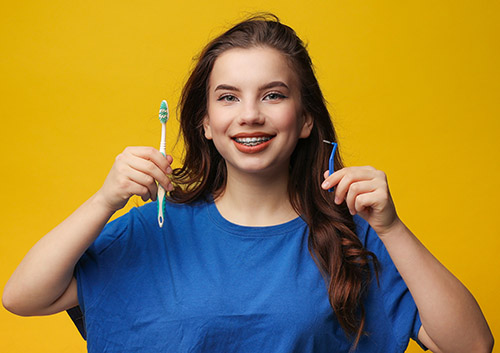Pet Project
February 4th, 2026

Many of us with feline and canine friends are positive we’ve seen them smiling. After all, who hasn’t basked in the tooth-filled grin of their delighted dog or the pleased expression of their contented cat?
Animal behaviorists will tell us, though, that our pets actually use many different body cues to signal happiness—and eyes, ears, and tails are better clues as to how happy or unhappy our furry companions are.
But even though animals don’t smile exactly the way we do, they do share some of the same oral concerns as their humans. Since February is Pet Dental Health Month, let’s look at some dental tips to keep your cats and dogs their healthiest and happiest.
Be Aware of Your Pet’s Dental Health Risks
Did you know that tooth and gum health is essential to the well-being of your canine or feline BFF? While cats and dogs don’t suffer from cavities as much as we do, they can suffer oral pain, infection, and trauma without proper dental care.
- Gum Disease
Gum disease is one of the leading causes of tooth loss in pets. Oral bacteria, food particles, and saliva combine and form plaque deposits which stick to the teeth. Over time, unless it’s removed, this plaque accumulates and hardens into tartar.
When plaque and tartar harden above and below the gumline, pets can develop gum irritation, inflammation, gingivitis, and, eventually, a serious gum disease called periodontitis. Untreated periodontal disease leads to infection, bone and tissue damage, and tooth loss.
- Tooth Resorption
Tooth resorption is another common cause of tooth loss in both cats and dogs. The inside of the tooth structure begins to erode, weakening the tooth and leaving it vulnerable to infection.
The cause of this disease is unknown, but the results can be quite painful and progressive. Your vet can determine which treatments might be effective to save your pet’s tooth or to alleviate pain.
- Trauma
A broken or fractured tooth should be examined by a veterinarian. A root canal, pulp therapy, or extraction might be needed to treat severe pain and infection.
Schedule Regular Exams with Your Vet
Your veterinarian is your partner in keeping four-legged family members healthy. Your dog or cat should see the vet at least once a year for a general checkup. At this time, your vet will look carefully at your pet’s teeth and gums to find any potential oral injuries or diseases.
Regular checkups mean you’ll catch any dental problems before they become more serious. Veterinarians can provide tips on daily dental care, recommend the best diet, suggest hygiene products and toys which promote dental health, and clean and treat your pet’s teeth under anesthesia if needed.
Know When to Call Your Vet
Your pets’ teeth and gums are your best guide to their oral health. If you see any of these symptoms of gum disease or tooth resorption an appointment with the veterinarian is in order:
- unusually unpleasant breath
- brown or yellow stains on the teeth
- swollen or bleeding gums
- pawing at the mouth
- heavy drooling
- loss of appetite
And, of course, If your cat or dog injures a tooth, you should call your vet immediately.
Clean Your Pet’s Teeth
One way to make sure that your pet’s teeth are the healthiest they can be is with brushing and cleaning. This is a project best started when your pet is young and more easily trained.
There are toothbrushes, toothpastes, and dental wipes designed just for your dog and cat (don’t use human products—they can be abrasive and unsafe). Your vet is the best resource for learning how to get your pet used to a toothbrush or finger brush.
If, despite your best efforts, brushing just isn’t going to happen, talk to your vet about anti-plaque additives, rinses, and gels formulated just for your pet.
Watch Your Pet’s Diet
Like us, our cats and dogs benefit from a dental-healthy diet. Different pets have different needs when it comes to the mix of proteins, vitamins, minerals, and other nutrients required for strong teeth and bones. Some foods are formulated with anti-plaque ingredients. Kibbles and treats are available with coatings designed to help prevent plaque formation.
Your veterinarian can help you discover the best foods for your pet’s needs, whether commercial or prescription.
We all love healthy smiles. Protect your dog’s fetching grin or your cat’s purr-fect gums in East Lyme, CT by making their oral health a pet project all year long.



